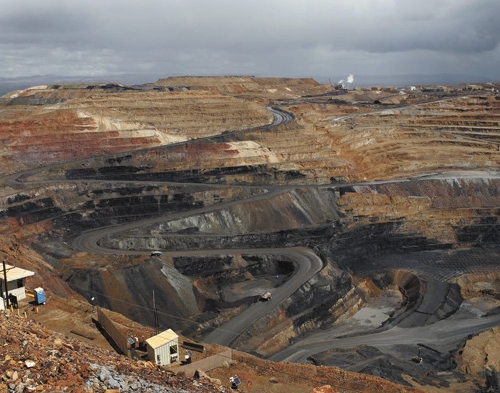Nevada mining ‘loopholes’ on table

CARSON CITY — Nevada’s mining industry faced further scrutiny Monday over its tax paying practices from the state’s tax commission and a leading Democratic lawmaker looking to raise more money for education and social service spending.
During a meeting of the Nevada Tax Commission, Senate Majority Leader Steven Horsford and other witnesses alleged regulators have allowed major mining companies to deduct too many expenses when calculating their taxes on "net proceeds of minerals" and suggested not only closing loopholes but asking the Legislature to strike controversial deductions.
If critics were to get their way the industry, led by major gold producers in the Nevada Mining Association, could wind up paying more taxes to the cash-strapped state government.
"We need to close this loophole now so we can get every dollar of revenue the state is otherwise entitled," Horsford, D-Las Vegas, told the commission while testifying on regulations he says go beyond the intent of state law. "Some of these deductions have been approved and they shouldn’t have been."
The commission hearing on mining taxes was the result of an admission last month by former state taxation director Dino DiCianno that his department hadn’t employed specialized mining auditors for two years, a statement that prompted DiCianno’s abrupt resignation and a call by Gov. Brian Sandoval for audits. It also prompted Horsford to ask the commission to adopt emergency regulation to disallow certain deductions.
Chairman Robert R. Barengo said the tax commission would review the controversial deductions Horsford highlighted, but would prefer to avoid confusing the issue further with emergency rule changes and instead focus on determining whether new permanent regulations were in order.
"Knowing the litigious nature of the mining industry, I suspect we will get lawsuits," Barengo said of the risk of making too many changes too quickly.
After the meeting, Horsford said the Legislature should consider changing the state law to strike certain deductions altogether.
"The Legislature needs to set the policy on which deductions are allowable," Horsford said. "Everything is on the table."
The commission, which voted unanimously to further explore mining tax regulations at its May 16 meeting, heard testimony from critics who said that over the years, deductions allowed by regulation have gone beyond what’s intended by law.
Laura Granier, an attorney for a coalition of mining exploration firms, said her review of the history of the regulations showed several examples of changes that allowed significant deductions made without input from the Legislature and, in some cases, over the objections of staff members.
One example Granier cited was the deduction allowed for sales and use taxes.
In 1979 such a deduction was prohibited. In 1984 the regulation was changed to strike the prohibition and in 2001 it was changed yet again to expressly allow a deduction for sales and use taxes paid.
The changes, which cover deductions worth millions, if not billions, of dollars over the decades, were made to the regulations even though the Legislature did nothing to the statutes.
A letter from the Nevada Mining Association cited other examples of deductions allowed by regulation but not covered in state law.
They included employee housing, fire insurance, corporate costs and travel.
But Jim Wadhams, an attorney for Newmont Mining, was careful to point out the letter wasn’t suggesting the deductions were improper.
"Many have said it was an admission of some sort," Wadhams said. "It clearly was not."
Tax commissioner George Kelesis took exception to the implication the commission was playing fast and loose with the regulations.
Kelesis challenged Horsford to explain why, if the regulations were flawed, the Legislature didn’t take make the law more clear.
"Where was the Legislature over the last 20 years if the tax commission in 1984 was misinterpreting a statute," he said.
Mining is under especially intense scrutiny because the majority Democrats in the Legislature are seeking to raise taxes to support spending beyond the $5.8 billion general fund budget proposed by Gov. Brian Sandoval for 2011-13.
Republicans so far have remained lockstep behind Sandoval, denying Democrats the two-thirds support they need to raise taxes in defiance of governor’s spending cap.
But Republicans have said they would sign off on more spending if the revenue comes from closing loopholes in tax regulations for mining, although that is unlikely to happen in time for the 120-day legislative session which is scheduled to conclude June 6.
Contact Benjamin Spillman at bspillman@reviewjournal.com or 702-477-3861.